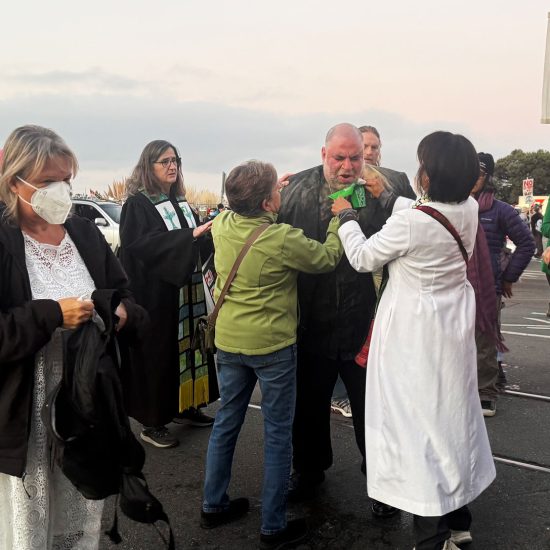
Populism has a strange relationship with the American people. Always a fixture in American politics, populism has lived on the fringe of the right and the left. An extreme political populist movement has seized control of the Republican Party and now threatens democracy in the wake of the 2024 presidential election. As Paul Taggarts, in Populism, comments, “It is hard to understand politics in the United States without some sense of populism.” The same holds true for all denominations and churches.

Rodney Kennedy
What often goes unnoticed in the variations of populism is the generic structure of the movement. Whether political or religious, populism always retains the power to dismantle the “in group.” It is an inherently unstable and difficult to manage faction. I offer this caveat about populism’s structure specifically to look at the 40-year-plus hierarchy of the Southern Baptist Convention. Is this populist movement ripe for another populist movement?
Here’s a rough outline of the historical development of a populist movement. A movement of the “people” produces an “elect” leadership” — authoritarian and demagogic. The leaders emerging from the populist coalitions of aggrieved people appoint themselves guardians of the people’s thoughts, beliefs, and commitments. Listen to Al Mohler or Andrew Walker long enough and you will hear them insist their God-given task is to interpret the Bible, the culture, the politics of the day for the less-informed Southern Baptists sitting in the pew.
A defining characteristic of populism has always been “the people.” Michael McGee, in In Search of ‘The People,’ says, “About the only point of agreement is that, in politics, ‘the people’ are omnipotent; they are an idea of collective force which transcends both individuality and reason.” In this reading, populism is a political movement from the “ground up.” What if Southern Baptists had a movement of the people — from the pew to the pulpit?
The rhetorical creation of “a people” is the first step in the redemptive vision of populism. As the movement consolidates power, there is a step away from “the people” and the creation of “the leader.” The political term for the leader is “charismatic.” The people feel themselves to be “one” with the leader. What matters to the people, rhetorically, is known as “pure identification” with the leader. The leader can be one person or a collective of persons with the authority to speak for the people. Charismatic leadership and its tendency toward authoritarianism make it dangerous as a basis for democratic policymaking.
For example, when the SBC had what looked like a debate about women in ministry at their annual gathering this year, the leaders allowed Rick Warren to speak on behalf of ordaining women as a “guest.” After Warren, SBC spokesperson and theologian Albert Mohler put the matter to rest by telling Southern Baptists what they believed and where they stood. The messengers then voted overwhelmingly to remove Saddleback Church from the SBC.
Warren’s speech on the floor at the gathering may be the seed planted for a new populist movement among Southern Baptists, especially if it is led by laypersons. In the present power arrangement, when there is a whisper of dissent in the SBC, only one response is required: “Better ask Al.” A leader-dominated denomination started by lay preachers who were farmers, teachers, doctors, and laborers has become a closed sect of literalists and experts in fundamentalism.
The leaders stifle dissent, preclude criticism, and subvert critical thinking into pure identification. Mohler and company act more like Puritan divines in 17th-century Massachusetts or Catholic prelates in medieval Europe than Baptist preachers. When Mohler sent Rick Warren packing at the 2024 SBC gathering, I saw visions of Roger Williams being expelled into a winter wilderness.
Herein lies the danger of populism. It goes from being a bottom-up movement to a top-down movement. Condescension reeks from this populist movement turned elitist authoritarian leadership. What populism can’t account for is how the leaders of the movement ascend the hill and become the authority and the elites. The structure of populism cries out for a new rebellion against the “elite” in every generation.
A populist movement carries within its structure the seeds of another populist rebellion. The people sitting in the pews were not raised with an innate belief in “experts.” They were raised to be suspicious of elitists. A new populist movement among Southern Baptists, a true movement of the “people” would put new life into what has become the old strictures of the current powers and principalities. This movement could arise in opposition to the anti-elitist spirit of previous generations of Southern Baptists.
Fundamentally, a populist movement that swept away the conservative takeover of the SBC would be just as valid as the conservatives doing away with moderate Baptists in the 1980’s. Perhaps the most serious charge the authoritarian leaders face: they have eviscerated dissent.

Photo by Javier Allegue Barros on Unsplash
Dissent has always been a key word in the vocabulary of Baptists. Baptists have proudly embraced the intended slur of “dissenters” with as much fervor as MAGA accepting the label of “deplorables.” Historically, the dissenters were those English Protestants who refused to conform to the doctrine, discipline, and worship of the Church of England as laid down in the 1662 Act of Uniformity. A healthy Baptist community encourages dissent as a right of free speech, as a means of discerning the will of God, and as a pedagogical tool. Dissent is the appropriate antidote to religious authoritarianism.
Dissent should be a vital part of Baptist life, not censured by authorities, or suppressed by excommunicating congregations from the convention. Baptist polity cannot be true to the principle of autonomy when dissent is stifled, named as sinful, and manipulated by the religious elites. The suppression of dissent causes the loss of the democratic spirit among Baptists. No subject is more salient to Baptists than a recovery of the art of dissent.
Such a movement would not be an attempt to gain control of the levers of political power in the Southern Baptist Convention but would be a minority voice raised as a counter-truth to the accepted rules and polities. Reinventing dissent among Southern Baptists would be the start of a new populist movement. Such an intervention would be reconstructive. Again, Baptist history recognizes the importance of being “nonconformists.” Such nonconformity barely exists in the current SBC structure.
A new populist movement among Southern Baptists would push back against unhealthy dogmatic conformity. Too often, Southern Baptist leaders think they are being radical and faithful and different by all being exactly the same as each other. Dogmatic, boring conformist “individualists” with a fixed set of beliefs impervious to rational dissent from others dominate.
To speak against the dominant ideology of the SBC will require advocates of change to speak “within the dominant ideology’s own vocabulary,” John Lucaites and Celeste Condit note. The very act of dissent within the framework of the convention’s rigidified conventions, habits, and practices creates a new populist movement. The advocates, speaking from within the community, disrupt and affirm. They embrace in reassuring ways historical Baptist principles that are recognizable, understandable, and deeply embedded in Baptist DNA.
My father was a Southern Baptist, a life-long Sunday school teacher, lay preacher, and ordained deacon. He represented the ordinary, “common man,” “man in the street,” “every man” of the SBC. He was a building block of the Southern Baptist church of my youth. He was one of the “people.” My dad would have dissented from the present strictures of the Southern Baptist leadership. And so would all his fellow deacons.
An outline of a new Southern Baptist populism would dissent from a leadership that has abandoned the Baptist faith:
- They have abandoned the First Amendment and true religious freedom.
- They have committed adultery with secular politics.
- They have embraced an anti-science extremism.
- They have discarded the priesthood of the believer.
- They have diminished the power of local church autonomy.
Dissenters and nonconformists among Southern Baptists need to reclaim their voices. Dissent, contention, and disagreement make for a healthy church, and a strong church requires church members and clergy with thick skins. A pluralistic polity is a rowdy affair by nature. It is a lively exercise of free speech which doesn’t suppress or ignore competing positions. And it is not boring.
Denominations tend to flow in one direction. The SBC seems on a determined course of strident Calvinism. Reversing that flow with a vibrant democratic dissent would be so much more interesting. And if it seems as if I am attempting, like Elijah, to be a “troubler of Israel,” that is a correct assumption. I’m not saying there will be a populist upheaval among Southern Baptists — I’m just saying the conditions are ripe for such a moment.
Rodney Kennedy has his M.Div. from New Orleans Theological Seminary and his Ph.D. in Rhetoric from Louisiana State University. The pastor of 7 Southern Baptist churches over the course of 20 years, he pastored the First Baptist Church of Dayton, Ohio — which is an American Baptist Church — for 13 years. He is currently professor of homiletics at Palmer Theological Seminary, and interim pastor of Emmanuel Friedens Federated Church, Schenectady, New York. His eighth book, Dancing with Metaphors in the Pulpit, is out now from Cascade Books.






